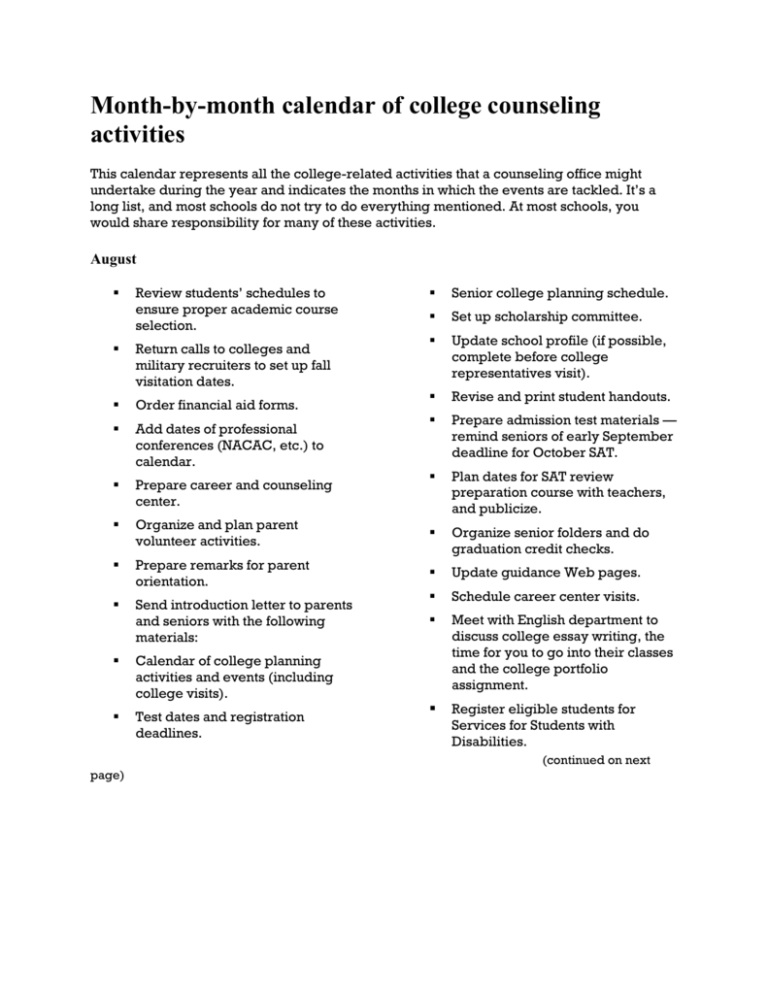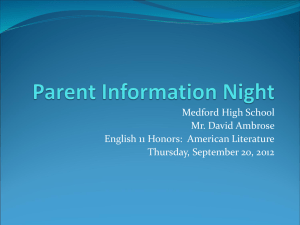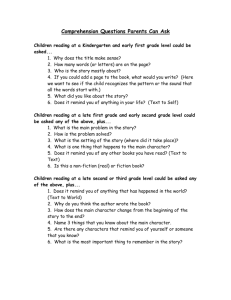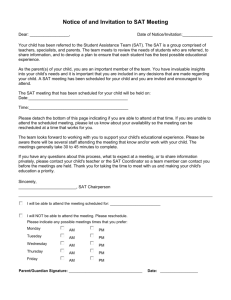
Month-by-month calendar of college counseling
activities
This calendar represents all the college-related activities that a counseling office might
undertake during the year and indicates the months in which the events are tackled. It’s a
long list, and most schools do not try to do everything mentioned. At most schools, you
would share responsibility for many of these activities.
August
Review students’ schedules to
ensure proper academic course
selection.
Senior college planning schedule.
Set up scholarship committee.
Update school profile (if possible,
complete before college
representatives visit).
Revise and print student handouts.
Prepare admission test materials —
remind seniors of early September
deadline for October SAT.
Plan dates for SAT review
preparation course with teachers,
and publicize.
Return calls to colleges and
military recruiters to set up fall
visitation dates.
Order financial aid forms.
Add dates of professional
conferences (NACAC, etc.) to
calendar.
Prepare career and counseling
center.
Organize and plan parent
volunteer activities.
Organize senior folders and do
graduation credit checks.
Prepare remarks for parent
orientation.
Update guidance Web pages.
Send introduction letter to parents
and seniors with the following
materials:
Schedule career center visits.
Calendar of college planning
activities and events (including
college visits).
Meet with English department to
discuss college essay writing, the
time for you to go into their classes
and the college portfolio
assignment.
Test dates and registration
deadlines.
Register eligible students for
Services for Students with
Disabilities.
(continued on next
page)
1-12
College Counseling Sourcebook, 7th Edition. © 2012 The College Board. All rights reserved.
Month-by-month calendar of college counseling activities
September
Check that PSAT/NMSQT materials
have arrived; reorder (or order
more) if necessary.
Announce SAT and/or ACT
registration; remind seniors to
register for the November SAT.
Distribute senior and junior
calendars.
Have seniors submit updated
resumes with spring term and
summer information, along with
any other information forms
needed for recommendations.
Attend NACAC conference.
Meet with finalists in the National
Merit Scholarship program,
Achievement Scholarship Program
for Black Students, National
Hispanic Recognition Program,
National Scholarship Service and
Fund for Negro Students, and/or
Telluride Association; ensure that
deadlines are met.
Gather information from faculty,
coaches and club advisers on
students for recommendations.
Visit classrooms regarding
PSAT/NMSQT.
Organize admission test prep
classes.
Distribute school-created collegecareer planning guides.
Prepare tutoring list.
Set up parent conferences.
Set up college day/night program.
Attend local counselor activities
hosted by colleges.
Set up senior meetings.
Set up group meeting with students
who are considering applying
under Early Decision/Early Action
plans.
Hold senior class meeting (reserve
auditorium) to review procedures
for testing, college application
process, financial aid,
scholarships, etc.
Meet with coaches on NCAA
eligibility requirements.
Meet with visiting college
representatives.
Set up an NCAA meeting with all
potential college athletes (grades
9-12) and their parents to discuss
expectations.
Distribute guidelines to teachers
for writing student
recommendations.
Emphasize to seniors that they
should be getting applications now
— either by downloading or by
mail.
Check the list of SSD students to
make preparations for
PSAT/NMSQT.
Visit classrooms regarding senior
planning, essay writing, etc.
Distribute calendar of high school
visitation days to college
campuses.
Arrange for proctor(s), room, etc.,
for the SAT and SAT Subject Tests™
administered at school for SSD
students.
Set up logistics of PSAT/NMSQT
with English and math
departments.
College Counseling Sourcebook, 7th Edition. © 2012 The College Board. All rights reserved. 1-13
Month-by-month calendar of college counseling activities
October
Set up scholarship files.
Coordinate testing: PSAT/NMSQT.
Present senior parent nights.
Host college day/night program.
SAT and SAT Subject Tests given.
Mail National Merit Scholarship
semifinalist information to National
Merit.
Prepare for Early Decision/Early
Action applications; remind
students to have scores from test
organizations sent to colleges.
Attend activities hosted by
colleges.
Registration for the SAT and SAT
Subject Tests.
Write letters of recommendation,
with priority to students applying
under Early Decision/Early Action
plans.
Meet with college representatives.
November
Arrange for proctor(s), room, etc.,
for the SAT and SAT Subject Tests
for SSD students.
SAT and SAT Subject Tests given.
Early Decision/Early Action
deadlines.
Senior reminders: testing,
recommendations, transcript
requests.
Write letters of recommendation
and remind teachers to complete
letters of recommendation.
Conduct financial aid seminars or
workshops.
Announce college fairs.
Remind seniors to register for the
December SAT.
Review senior grades at end of
grading period.
Remind ESL students to register for
the TOEFL — Test of English as a
Foreign Language.
Remind students to request college
housing applications.
Hold special programs for athletes,
service academy applicants and
students with disabilities.
Continue meeting with seniors;
discuss how to fill out applications
and give feedback on essays.
Review college choices with
seniors to ensure that there is an
adequate number of “safety”
colleges on each list.
Remind seniors to register for the
January SAT.
1-14
Remind foreign citizens to
complete Certification of Finances
and obtain multiple copies, with
original signatures to be sent with
each application.
Review student transcripts.
Attend the College Board Forum.
College Counseling Sourcebook, 7th Edition. © 2012 The College Board. All rights reserved.
Month-by-month calendar of college counseling activities
December
Prepare for applications due in
January — ensure that all
recommendations are completed;
remind seniors to have scores sent
from testing organizations to
colleges.
Host financial aid night for parents
(English and Spanish). Remind
seniors and their parents to
complete the FAFSA as soon after
Jan. 1 as possible; also remind
them to complete all necessary
financial aid forms.
SAT and SAT Subject Tests given.
Many selective colleges have
December deadlines for
applications.
Early Decision and Early Action
letters arrive.
Invite recent high school graduates
to discuss their college
experiences at the school during
their winter break.
Conference with first-generation
students to ensure that they are on
track.
Write letters of recommendation.
ROTC scholarship deadline.
Arrange for proctor(s), room, etc.,
for the SAT and SAT Subject Tests
for SSD students.
Arrange for speaker(s) at college
night for parents of juniors to be
held in February (covering college
application process, testing,
financial aid, etc.).
Review PSAT/NMSQT results with
students. Let each student know
what he or she can do to improve
scores.
Update and send letter to parents
of sophomores and juniors
regarding PSAT/NMSQT results
(junior letter contains a reminder
about February college night).
January
Prepare for applications due in
February — ensure that all
recommendations are completed;
remind seniors to have official
scores sent from test companies.
Tell seniors to contact universities
by either email or phone to make
sure their applications were
received. Also, check postcards to
determine which have been
received.
Prepare for college night for
parents of juniors; send final
reminders/invitations to parents.
Arrange for proctor(s), room, etc.,
for standardized admission tests for
SSD students.
Publicize scholarship
opportunities.
Set up junior timelines and
meetings.
Prepare midyear report forms and
send to colleges.
Remind students to submit financial
aid applications.
Complete any unfinished letters of
recommendation.
College Counseling Sourcebook, 7th Edition. © 2012 The College Board. All rights reserved.
1-15
Month-by-month calendar of college counseling activities
February
Finalize all plans and materials for
college night for parents of juniors
(have extra materials available for
divorced/separated parents in
attendance).
Many selective colleges have
February deadlines for financial
aid applications.
Attend the College Board Regional
Forum.
Respond to students’ notifications
of rolling decisions.
Review midterm grades; meet with
at-risk seniors.
Begin meeting with juniors and
their parents; discuss aftergraduation plans and the college
admission process; remind
students to register for the March
and May SAT tests.
Publicize scholarships.
Set up community college
nights/days/visits.
Promote college visits.
Encourage juniors to gather
information about service
academies.
Prepare letter to parents of eligible
SSD juniors and include a copy of
the College Board letter for SSD
students, with instructions for
registering for the spring and fall
SAT tests.
March
Hold faculty workshops on
recommendation guidelines.
Promote registration for
standardized admission tests and
APR Exams.
Hold practice college admission
testing workshops for ninth- and
10th-graders.
Have a community college day for
students, night for parents.
Hold military days.
Schedule statewide testing
program.
Arrange for proctor(s), room, etc.,
for SAT and SAT Subject Tests for
SSD students.
1-16
Discuss summer plans with
students; offer advice on activities
and internships in which they can
participate.
Meet with seniors to discuss
college admission decisions;
remind students to notify each
college of their decisions (only
after receiving all financial aid
offers); discuss alternative choices
and wait-list strategies, when
appropriate.
Continue meetings with juniors;
discuss teacher recommendations
and plan appropriate steps to meet
the students’ goals.
Send forms to
teachers/coaches/advisers for
information about juniors (for
letters of recommendation).
Provide the NCAA updated core
course information for the coming
year.
College Counseling Sourcebook, 7th Edition. © 2012 The College Board. All rights reserved.
Month-by-month calendar of college counseling activities
April
Distribute summer program
information and applications.
Provide financial aid counseling.
Hold parent conferences (grades,
admission and junior testing).
Hold transition workshops for
seniors.
Hold scholarship committee
meetings.
Promote and attend college fairs.
Promote college visits over spring
break.
Meet with nongraduating seniors.
SAT and SAT Subject Tests given.
Continue meeting with juniors and
their parents, and remind them to
ask their teachers for
recommendations (many teachers
will write the recommendations
after the junior year).
Continue meeting with
sophomores and juniors.
Schedule dates for next year’s
guidance events.
Generate college acceptance list
and senior plans list for school
board.
Order PSAT/NMSQT materials for
fall.
Arrange for proctor(s), room, etc.,
for SAT and SAT Subject Tests for
SSD students.
Continue senior meetings to
discuss admission decisions.
Remind students to send their letter
of intent to register to one and only
one college by May 1.
May
June
Hold awards ceremonies to
recognize students receiving
scholarships, service academy
appointments and other academic
awards.
Submit final SSD eligibility forms
for students.
Send final transcripts to colleges.
Review summer school
applications, especially for
students who will be graduating.
Survey seniors to gather
postgraduation plans.
Promote college visits over the
summer break.
Remind junior athletes to send
NCAA release form to NCAA
Clearinghouse.
Prepare map or list of college
acceptances.
Prepare scholarship report.
July/August
Attend professional conferences.
Visit colleges.
Take a vacation where there are no
phones and no mail to open.
Pamper yourself for a week or two.
Take a deep breath and get ready
to begin the process all over again.
Source: Adapted from materials developed by the Western Association for College Admission Counseling
College Counseling Sourcebook, 7th Edition. © 2012 The College Board. All rights reserved.
1-17









